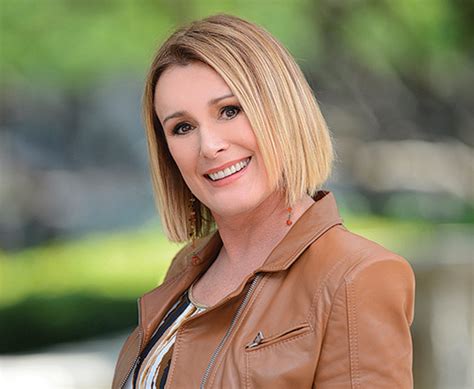A Quote by Lewis B. Smedes
The difference between guilt and shame is very clear--in theory. We feel guilty for what we do. We feel shame for what we are. A person feels guilt because he did something wrong. A person feels shame because he is something wrong. We may feel guilty because we lied to our mother. We may feel shame because we are not the person our mother wanted us to be.
Related Quotes
The best definition I've heard is that guilt is about what you've done, shame is about who you are. If something's out of my control, I don't feel shame about it, because what could I have done? If you're guilty, you can at least try to atone for it or make it better or not do it again. If it's who you are, you can't do much about it except change yourself, and that's pretty hard.
We feel properly embarrassed when we are caught doing something that makes us look inept, knuckleheaded, or inappropriate. Maybe the difference is this: we feel embarrassed because we look bad, and we feel shame because we think we are bad. When we are embarrassed, we feel socially foolish. When we are shamed, we feel morally unworthy.
What should our second generation have done, what should it do with the knowledge of the horrors of the extermination of the Jews? We should not believe we can comprehend the incomprehensible, we may not compare the incomparable, we may not inquire because to inquire is to make the horrors an object of discussion, even if the horrors themselves are not questioned, instead of accepting them as something in the face of which we can only fall silent in revulsion, shame and guilt. Should we only fall silent in revulsion, shame and guilt? To what purpose?
Feelings and stories of unworthiness and shame are perhaps the most binding element in the trance of fear. When we believe something is wrong with us, we are convinced we are in danger. Our shame fuels ongoing fear, and our fear fuels more shame. The very fact that we feel fear seems to prove that we are broken or incapable. When we are trapped in trance, being fearful and bad seem to define who we are. The anxiety in our body, the stories, the ways we make excuses, withdraw or lash out—these become to us the self that is most real.
Shame is the proper reaction when one has purposefully violated the accepted behavior of society. Inflicting it is etiquette's response when its rules are disobeyed. The law has all kinds of nasty ways of retaliating when it is disregarded, but etiquette has only a sense of social shame to deter people from treating others in ways they know are wrong. So naturally Miss Manners wants to maintain the sense of shame. Some forms of discomfort are fully justified, and the person who feels shame ought to be dealing with removing its causes rather than seeking to relieve the symptoms.
I have since talked to some of my girlfriends sexual assault and found out that they had their own experiences that they never shared at the time. It was never talked about it. And I think it's because of that normal response - you feel badly, you feel responsible, you feel guilty, you feel like you did something wrong, you feel ashamed.
Guilt is also a way for us to express to others that we are a person of good conscience. 'I feel really guilty about getting drunk last night,' we say, when in actual fact we feel no guilt whatsoever or, at least, we could choose to feel no guilt. When people say to me, 'I drank too much last night,' I always reply, 'I drank exactly the right amount.
Despite their differences, pride, shame, and guilt all activate similar neural circuits, including the dorsomedial prefrontal cortex, amygdala, insula, and the nucleus accumbens. Interestingly, pride is the most powerful of these emotions at triggering activity in these regions - except in the nucleus accumbens, where guilt and shame win out. This explains why it can be so appealing to heap guilt and shame on ourselves - they're activating the brain's reward center.


































